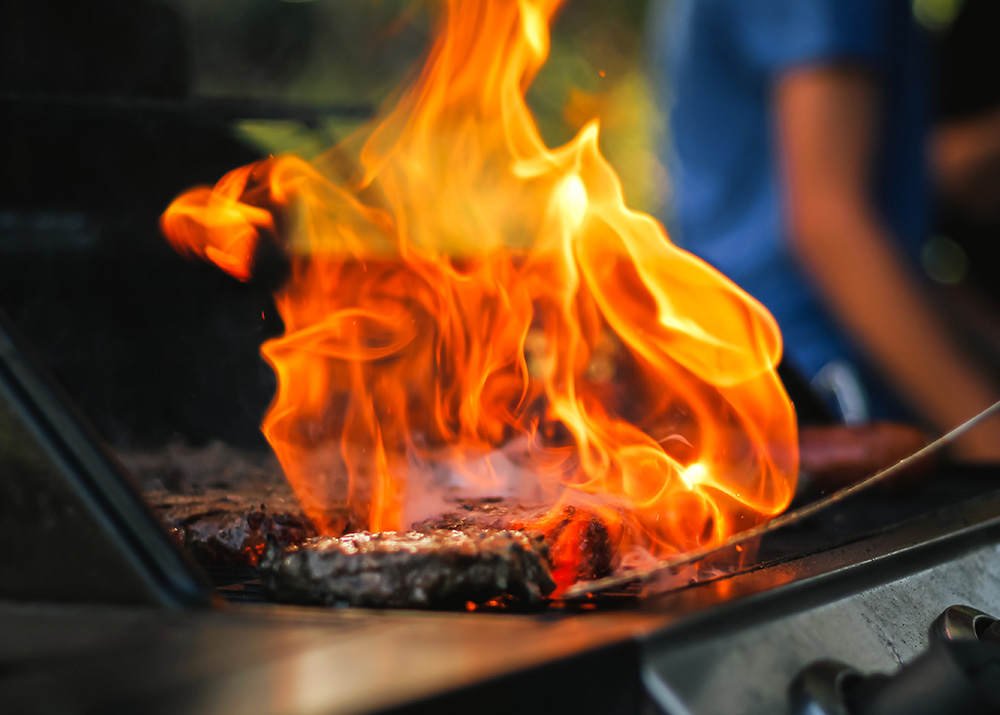Blog
Gas Grill Flare-Ups: Causes, Prevention, and Safety Tips

Nothing interrupts a barbecue faster than sudden flames shooting up from your grill. Gas grill flare-ups are a common issue, but with the right knowledge, you can keep them under control and enjoy safer, more consistent cooking.
What is the most common cause of grill fires?
Flare-ups happen when fat, grease, or marinades drip onto the flames, igniting and creating bursts of fire. Common causes include:
-
Dripping Fat and Grease – Cuts of meat with higher fat content can release drippings that fuel flames.
-
Marinades and Sauces – Excess oil or sugary sauces can drip onto burners.
-
Lack of Cleaning – Old food residue and grease build-up act as fuel for sudden fires.
-
Wind – Strong gusts can force oxygen into the flames, making flare-ups worse.
How do you stop a BBQ from catching fire?
The best defence against flare-ups is preparation and grill care. Here’s what to do:
-
Trim Excess Fat – Remove extra fat from meats before cooking. Try using the hotplate for most of the cook, then finish on the grill for flavour and searing.
-
Clean Regularly – Scrape down and clean your grill often to reduce grease build-up.
-
Use a Drip Pan – Place a pan under the grill to catch drippings during indirect cooking.
-
Control the Heat – Cook at medium to low temperatures and avoid placing food directly over burners.
-
Pat Food Dry – Dab off excess oil or marinade before cooking to minimise dripping.
What to do if a barbeque catches fire?
Even with precautions, flare-ups can still happen. Here’s how to handle them safely:
-
Move the Food – Shift food to a cooler zone or warming rack with tongs.
-
Turn Down or Off Burners –Quickly reduce the heat by turning the affected burners down or completely off.
-
Never Use Water – Water and grease don’t mix—spraying water can spread flames. Instead, sprinkle baking soda or salt to smother small flare-ups.
How to put out a barbeque grill fire?
If a flare-up grows out of control, act quickly:
-
Turn Off the Gas – Switch burners off and close the propane tank valve.
-
Close the Lid – This cuts off oxygen and helps suffocate the fire.
-
Use Baking Soda or Salt – Pour directly onto flames to smother them.
-
NEVER Use Water– Do not pour water on a grill fire, especially a grease fire, as it will spread the fire and make the situation worse.
-
Use a Fire Extinguisher (if available) – A dry chemical extinguisher is best for larger grill fires.
-
Call for Help – If the fire spreads or reaches the gas hose/tank, evacuate and call 000 emergency services immediately.
Important Safety Reminders
-
Keep a box of baking soda or salt nearby whenever you grill.
-
Stay by your barbecue while cooking - never leave it unattended.
-
Regular cleaning reduces the risk of flare-ups and keeps your grill performing at its best.
-
Be extra cautious when cooking fattier cuts of meat, as these are more prone to dripping and flaring.
Final Tip: Flare-ups don’t have to ruin your barbecue. With the right preparation and quick action, you can keep the flames under control and enjoy perfectly cooked meals every time.

